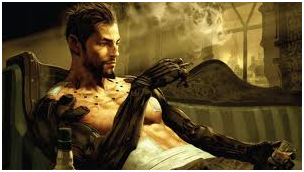Is technology a tool for emancipation or slavery? Anyone who has tried to run iTunes on a PC knows the answer: both. It giveth with one augmented, double-thumbed hand while the other reacheth around and stealeth your wallet.
DE:HR explores this theme in a cyberpunk future. By 2027, technology has improved to the point where you can buy cool cybernetic body augmentations at retail outlets. There are civilian augs, like cerebral implants that reduce the burning sensation when you read Herald Sun articles, and military augs, like blades that shoot out of your elbows, reverse Wolverine style. The backhander is that augs make you a drug addict. In assembling the wider world, Eidos Montreal have reached into the dystopian grab bag and pulled out some stalwarts: dwindling resources, wealth disparity, corporations being corporationy with private armies. As with all good scifi, when we stare at it, it stares back with insights on present day issues.
What do you call it when someone fakes you out with a robotic arm? An aug psych
Although DE:HR’s themes are familiar, they are explored in some depth, typically Socratically, through dialogue with others. The fiction is buttressed by solid art design and soundtrack. There is a strong black and gold theme running through most locations. Though the colours are similar, the various locations have distinct local flavour as you globetrot from America to China and beyond. The environments are arty enough to wow you, while being well-designed as game spaces so you know what can be interacted with.
The artiness extends to people’s clothes. 2027 has gone extreme retro — to the Renaissance — and ruffs are back in, big time. The Mighty Boosh almost got it right. The weak point of the game’s presentation is the character animations and voice acting, but I forgave this because for the most part the dialogue was above par. There is too much “Me No Rikey” in the Chinese folks though.
Michael McCann’s soundtrack drips with futuristic melancholy, like ambient Vangelis with a better synth. It’s the kind of music I would love my house to play to me every time I came home, if I had a talking house like in Watch This Space.
So, it’s got a solid scifi setting and nice art — how does this mofo play?
You play as accidental cyborg Adam Jensen, an ex-cop who now works as a private security for Sarif Industries, a biotech company that develops augmentations. Jensen gets fitted with the company’s entire catalogue after an incident about five minutes into the game so don’t think I’ve spoiled anything. These augs form the basis of my fourth favourite RPG mechanic, the Rudimentary Upgrade System.
What do you call a bunch of cybernetics in a military parade? Augie March
There are four main aspects to play — combat, stealth, computer hacking and dialogue. Augmentation upgrades will give you perks for these aspects, or they will improve your general exploration skills, like letting you jump higher, fall further or punch through walls. This is as cool as it sounds.
Combat is cover shooting, with a side order of melee in the form of one-shot stealth takedowns. Guns can be upgraded with mods and a fully modded weapon is significantly more effective than a vanilla one. Enemy AI will do standard cover shooter stuff, pin you down and try to flank you, and there’s sufficient variety of goon types to keep things interesting. You could play DE:HR entirely as a cover shooter and ignore stealth, but if that’s your bag, beware of Jensen’s low bullet-absorption capacity.
Stealth is where the game is mostly at, and it’s great to see the return of proper stealth mechanics. It’s not a real stealth game unless you can drag bodies around. The variety of stealthy things you can do gets you thinking creatively about how to deal with situations.
You will know the stealthing has its hooks in you when you find yourself reloading a save to get through a situation just right — not because you got killed but because you want to do it properly and without tripping the alarm, dammit — and we all love it when a plan comes together.
It’s not quite up to the platinum standard of Metal Gear Solid 4, but it’s a close second-best. MGS4 takes the bickies (while you’re not looking of course) because it gives you more stealth tools. DE:HR has other irons in the fire though.
The hacking minigame is based on capturing enemy nodes before the opposition detects you and captures yours. There are optional bonus nodes that yield goodies, and it’s up to you to decide whether you’ll press your luck to go for them. The layout of each node map can be designed differently, allowing for a chance to vary the difficulty and keep things interesting. This is the best hacking minigame I’ve ever played. It doesn’t get old by endgame and has ways to ramp up the difficulty without feeling cheap. The game around you doesn’t stop while you hack — guards or security cameras can detect you, adding to the tension.
Dialogue is a mix of standard menu-based selections and picking the attitude of your response that you think will garner the best response, like in Alpha Protocol. Persuading people can save you a lot of running around. Not every situation can be solved through conversation, but it pops up in plot-crucial moments. Often you will be required to make selections based on what you know about the person’s personality or about the situation at hand — it’s a little more nuanced than LA Noire’s “check for shifty eyes” reading of body language. LA Noire did better face animations but the characters in DE:HR have more interesting things to say.
What do you call a diagram of a cybernetic eye? An aug chart
“Choice and consequence” is an oft-used term in the Cave of Assessment. That’s because they’re important, dammit! They are features that set video games apart from most other art forms.
While the storyline of DE:HR gives you a laughably superficial amount of choice, the four play styles give you steamy dollops of choice as to how you play through missions. Most problems have multiple solutions.
You might have to get into a guy’s room to search it for something. There could be two guards at the front door that you could take out, a vent that leads into it from another room, a back door with a hackable lock on it and someone down the street who knows a password to give to the guards to let you in. While any one of these options is viable, if you’re an XP hound like me, you’ll go down the street, get the password, hack the back door, open the front door and knock out the guards, search the room, read all the emails on the guy’s PC, eat his food, move the fridge, then leave through the vent.
You can’t upgrade every aug, and you won’t be able to carry everything you pick up either, so you’ll have to choose what you want in your bag of tricks. Fun weapons like rocket launchers are big — do you want to lug one all the way through a level just to pop two shots off at a boss an hour later? Maybe you do, you magnificent bastard.
One gripe with the game was that there weren’t enough candy bars. Candy bars restore depleted batteries, and batteries are needed to use the cooler augs, especially unarmed stealth takedowns. Candy bars are relatively rare to find or buy compared to gun ammo, and many levels do not have shops. Stealth play already involves hiding and waiting. Eventually — about the time I found a silencer for my pistol — hanging out to recharge batteries became a wait too far. I abandoned my no-kill intentions and started taking dudes out. But that’s just me. The game will not punish you for this, although you get more XP for stealthy, no-kill play than for instigating fatalities.
What do you call a bunch of cyborgs having sex? An augy
This game has boss fights. They force you to be good at some form of armed combat. Some folks have said the boss fights spoil the game, usually because they were playing as Noguns McHackysneak and suddenly they had to shoot someone. Just because people who were playing DE:HR as a burglary simulator got a rude shock doesn’t mean the boss fights are bad. They present a difficulty spike, but they are not unfair. They require that you be familiar with certain game mechanics to progress, as boss fights should. In keeping with the rest of the game, there are different ways to deal with each boss. I honestly don’t see the problem. The key is to know they are coming and be prepared. Here’s a spoiler free tip: keep a couple of unspent upgrade points up your sleeve for when you meet the next boss, so you can buy your augs when you know what you need. And save often.
If you ignore this game because of what you’ve heard about the boss fights, you’re turfing some healthy baby twins for the sake of a few drops of bathwater.
What do you … nah, I’m out
DE:HR is a triple threat — it’s got a well-realised game world, engaging storyline and flexible game mechanics that give you choice in how you play. Most games are lucky to have one and a half of these elements. It makes some jarring mistakes, but they’re not enough to ruin this outstanding game.
Well, maybe by a point.
| Category | Rating |
| Game mechanics: | 9 |
| Atmosphere: | 10 |
| Addictiveness: | 8 |
| Overall: |
9 |
– Felix






